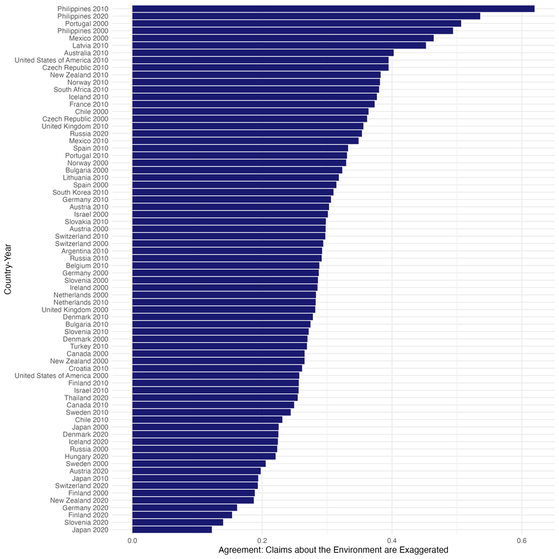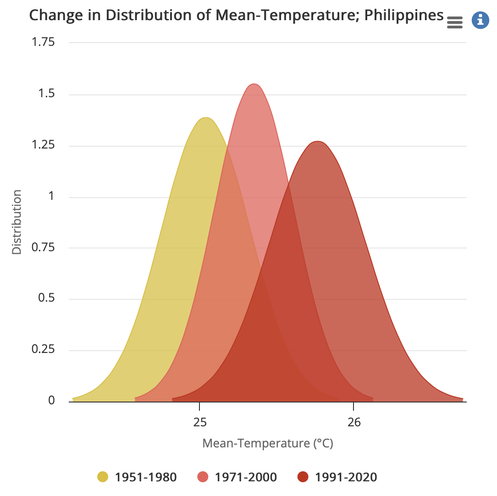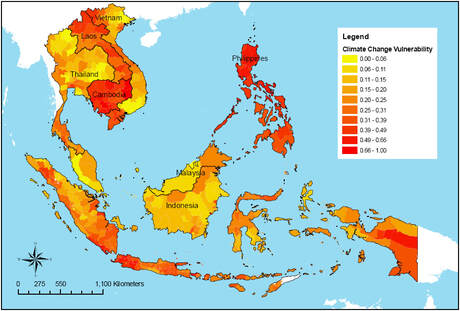research:
current projects
environmental AND climate change beliefs
Broadly conceived, this project explores the determinants and consequences of environmental and climate attitudes-both liberal (i.e., pro-environmental) and illiberal (i.e., climate change skepticism)-from a global perspective. Drawing upon a world society framework, I explore how integration into the liberal world order shapes individuals' beliefs and actions across several interrelated papers.
 Average climate skepticism by country.
Average climate skepticism by country.
I. Inhibiting or Contributing? How Global Cultural Forces Impact Environmental and Climate Change Skepticism
Throughout 2023, climate records have continued to shatter, sometimes daily, as average global temperatures rise to unprecedented levels. Yet environmental and climate change skepticism persists. For instance, approximately one third of individuals from around the world surveyed by the International Survey Program (ISSP) agree that "claims about the environment have been exaggerated." What shapes these beliefs? Currently, a wealth of research identifies several micro-level determinants of climate skepticism, including gender, political ideology, race, and education. Others identify view sentiments as symptomatic of illiberal anti-globalization populist backlash, manifesting in response to global economic downturns and the uncertainty, unemployment, and financial precarity they engender. Yet what remains to be seen is how macro-level global factors, particularly those of a cultural nature, bolster or reduce such beliefs.
Drawing upon ISSP data from 2000-2020, this paper uses multilevel modeling to evaluate the impact of nations' embeddedness within global liberal frameworks on climate skepticism, both generally and amidst anti-liberal pushback. Although in general, embeddedness is linked to reduced skepticism, when liberal and illiberal forces interact - a situation I refer to as "cultural dissonance," the ability of liberalism to counteract illiberalism varies by the level at which dissonance occurs. At the national level in authoritarian regimes, people are amenable to liberal influences; however, at the individual level, right-wing respondents remain skeptical.
Throughout 2023, climate records have continued to shatter, sometimes daily, as average global temperatures rise to unprecedented levels. Yet environmental and climate change skepticism persists. For instance, approximately one third of individuals from around the world surveyed by the International Survey Program (ISSP) agree that "claims about the environment have been exaggerated." What shapes these beliefs? Currently, a wealth of research identifies several micro-level determinants of climate skepticism, including gender, political ideology, race, and education. Others identify view sentiments as symptomatic of illiberal anti-globalization populist backlash, manifesting in response to global economic downturns and the uncertainty, unemployment, and financial precarity they engender. Yet what remains to be seen is how macro-level global factors, particularly those of a cultural nature, bolster or reduce such beliefs.
Drawing upon ISSP data from 2000-2020, this paper uses multilevel modeling to evaluate the impact of nations' embeddedness within global liberal frameworks on climate skepticism, both generally and amidst anti-liberal pushback. Although in general, embeddedness is linked to reduced skepticism, when liberal and illiberal forces interact - a situation I refer to as "cultural dissonance," the ability of liberalism to counteract illiberalism varies by the level at which dissonance occurs. At the national level in authoritarian regimes, people are amenable to liberal influences; however, at the individual level, right-wing respondents remain skeptical.
II. Experimental Survey in the Philippines
The Global Climate Risk Index identifies the Philippines as one of the top countries affected by climate change between 2000 and 2019. Yet despite this high environmental risk, a condition which might reasonably mitigate anti-environmentalism, people in the Philippines represent the world's top climate change skeptics (based on nations sampled by the ISSP). The Philippines therefore provides an opportune and intriguing case with which to explore climate skeptic beliefs in greater depth. Using a battery of original survey questions to construct the novel "climate skeptic index," this project investigates the correlates of climate skepticism and its various dimensions, this project more systematically explores anti-climate beliefs as a form of populist backlash, as well as the factors which shape it. It also uses an experimental survey design to explore the causal determinants of such illiberal environmental beliefs. For instance, one question tests whether the extent to which climate skepticism is caused by their distrust in the liberal global elite--a common populist viewpoint. Expanding on the base established by the above paper, this survey will therefore 1) expand on our knowledge of climate skepticism and its various dimensions, and 2) test whether individual backlash towards, and support for, pro-environmental narratives and action is causally linked to one's affinity or disdain for global actors and the liberal messages they convey.
The Global Climate Risk Index identifies the Philippines as one of the top countries affected by climate change between 2000 and 2019. Yet despite this high environmental risk, a condition which might reasonably mitigate anti-environmentalism, people in the Philippines represent the world's top climate change skeptics (based on nations sampled by the ISSP). The Philippines therefore provides an opportune and intriguing case with which to explore climate skeptic beliefs in greater depth. Using a battery of original survey questions to construct the novel "climate skeptic index," this project investigates the correlates of climate skepticism and its various dimensions, this project more systematically explores anti-climate beliefs as a form of populist backlash, as well as the factors which shape it. It also uses an experimental survey design to explore the causal determinants of such illiberal environmental beliefs. For instance, one question tests whether the extent to which climate skepticism is caused by their distrust in the liberal global elite--a common populist viewpoint. Expanding on the base established by the above paper, this survey will therefore 1) expand on our knowledge of climate skepticism and its various dimensions, and 2) test whether individual backlash towards, and support for, pro-environmental narratives and action is causally linked to one's affinity or disdain for global actors and the liberal messages they convey.

